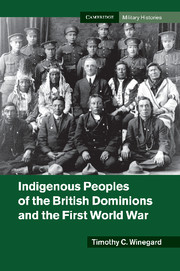Book contents
- Frontmatter
- Contents
- Figures
- Maps
- Tables
- Acknowledgements
- Note on the text
- Introduction
- 1 Colonization and the settler state
- 2 Racial constructs and martial theories
- 3 Precedents of military pragmatism
- 4 Dominion defence acts
- 5 1914: Subjugated spectators
- 6 1915–1916: King and country call
- 7 1917–1918: All the King’s men
- 8 Indigenous soldiers
- 9 The home front
- 10 Peace with prejudice
- Conclusion
- Bibliography
- Index
- References
Introduction
Published online by Cambridge University Press: 05 June 2014
- Frontmatter
- Contents
- Figures
- Maps
- Tables
- Acknowledgements
- Note on the text
- Introduction
- 1 Colonization and the settler state
- 2 Racial constructs and martial theories
- 3 Precedents of military pragmatism
- 4 Dominion defence acts
- 5 1914: Subjugated spectators
- 6 1915–1916: King and country call
- 7 1917–1918: All the King’s men
- 8 Indigenous soldiers
- 9 The home front
- 10 Peace with prejudice
- Conclusion
- Bibliography
- Index
- References
Summary
The outbreak of the First World War shattered almost a hundred years of relative peace in Europe. Its nations had circumvented large-scale conflict since the defeat of Napoleon in 1815 through treaties, alliances and an aspiration to maintain a balance of power in Europe and empire. In place of war, European armies were deployed to the fringes of empire to gain territorial acquisitions within the imperial scramble, or to quell indigenous rebellions in existing colonies. By 1914, the pan-European empire covered 84% of the globe, compared with 35% in 1800. The British empire encompassed one-fourth of the world and 445 million people lived under some form of British rule. Within the social norms of this Victorian era, and the prevailing ethnocentric ideologies of Social Darwinism, indigenous peoples were seen as an unfortunate component of the ‘white man’s burden’.
At the onset of war, no imperialist European state, save for France, regarded its colonial indigenous populations as a source of military manpower for a European war. Contemporary science, social biases and public opinion accepted that certain identifiable ethnic groups lacked the intelligence and integrity to fight modern war. It was also believed that since these groups were the subjects of vast European empires, prudence warned against allowing them to fight in a European war, thus forfeiting white racial supremacy. However, by late 1915, with mounting casualties and an increasing demand for manpower, Britain specifically requested the military inclusion of indigenous populations from the five Dominions.
- Type
- Chapter
- Information
- Publisher: Cambridge University PressPrint publication year: 2011



